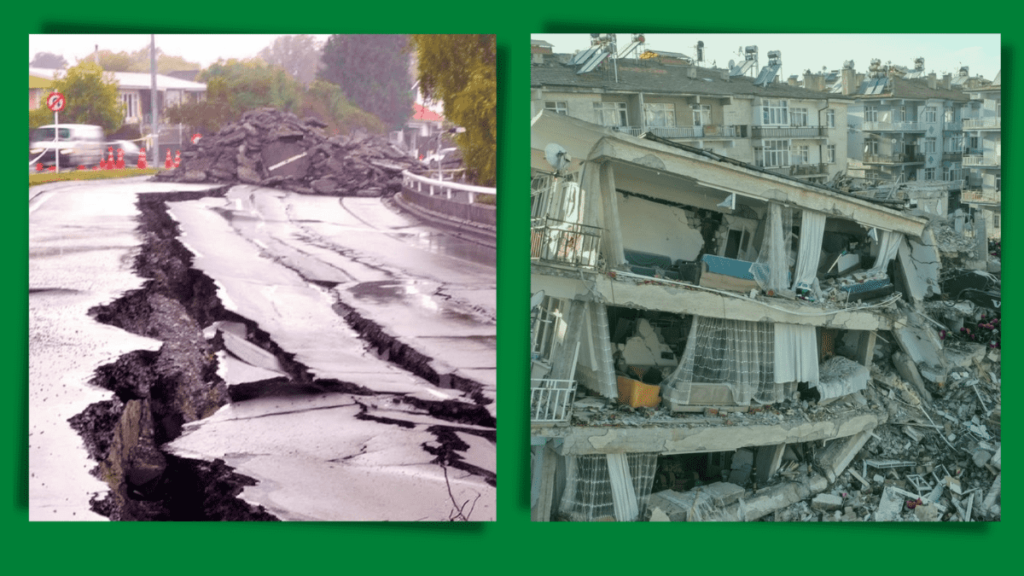Essay on Earthquake
An earthquake is a natural disaster that occurs when the earth’s crust experiences a sudden shift, causing the ground to shake and vibrate. Earthquakes can range in intensity from mild tremors to devastating quakes that can destroy entire communities. They can occur anywhere in the world, and although earthquakes are usually associated with tectonic plate boundaries, they can also occur in the middle of tectonic plates.
There are several different types of earthquakes, including tectonic earthquakes, volcanic earthquakes, and artificial earthquakes. Tectonic earthquakes occur when the earth’s crust experiences a sudden shift along a fault line, usually as a result of the movement of tectonic plates. These types of earthquakes are the most common and are usually the result of the release of built-up tension between the plates.
Volcanic earthquakes occur when volcanic activity causes the ground to shake. These earthquakes are often accompanied by volcanic eruptions and can be just as devastating as tectonic earthquakes.

Artificial earthquakes are caused by human activity, such as the detonation of explosives or the injection of fluids into the ground. These earthquakes are generally less intense than tectonic or volcanic earthquakes, but they can still cause damage and destruction.
The intensity of an earthquake is measured using the Richter scale, which rates earthquakes on a scale of 1 to 10. Earthquakes with a rating of 5 or higher are considered moderate to strong, while earthquakes with a rating of 7 or higher are considered major earthquakes. The most intense earthquakes can have a rating of 8 or higher and are capable of causing widespread destruction and loss of life.
For You >> Short Essay On Earthquake
The effects of an earthquake depend on several factors, including the intensity of the earthquake, the distance from the epicenter, and the type of soil and rock present in the area. Strong earthquakes can cause the ground to shake violently, causing buildings, bridges, and other structures to collapse. Earthquakes can also trigger landslides, avalanches, and other natural disasters, such as tsunamis.
The impact of an earthquake on a community can be devastating, with loss of life, injury, and damage to property being the most common consequences. Earthquakes can also disrupt essential services, such as electricity and water, and can have long-term economic consequences for the affected area.
There are several ways to reduce the impact of earthquakes, including proper building construction and land use planning. Buildings should be designed and constructed to be able to withstand the shaking caused by an earthquake, and land use planning should take into account the risk of earthquakes in the area.
There are also several ways to prepare for an earthquake, including having an emergency kit on hand and knowing what to do during and after an earthquake. It is important to have a plan in place and to know how to stay safe during an earthquake.
Earthquake Essay Conclusion
In conclusion, earthquakes are natural disasters that can have devastating consequences. They can occur anywhere in the world and can range in intensity from mild tremors to intense quakes capable of causing widespread destruction and loss of life. It is important to be prepared for earthquakes and to take steps to reduce their impact on communities.
Causes of Earthquake
An earthquake is a natural disaster that occurs when the earth’s crust experiences a sudden shift, causing the ground to shake and vibrate. The main cause of earthquakes is the movement of tectonic plates, which are constantly moving due to convection currents in the earth’s mantle. There are three types of tectonic plate boundaries: convergent, divergent, and transform. Earthquakes can also be caused by volcanic activity and human activity. The intensity of an earthquake is affected by its depth, the type of soil and rock in the area, and the distance from the epicenter.
Ways to reduce the impact of the earthquake
There are several ways to reduce the impact of earthquakes and protect communities from their effects. Some of these measures include:
- Building codes: Ensuring that buildings are constructed according to earthquake-resistant building codes can help to reduce the risk of collapse and other damage during an earthquake. These codes specify the materials and construction methods that should be used to make buildings more resistant to shaking.
- Earthquake-resistant design: Engineers can design buildings and other structures to be more resistant to earthquakes by using special techniques and materials. For example, buildings can be designed with flexible foundations, or with special devices called “base isolators” that allow the building to move slightly during an earthquake, reducing the forces on the structure.
- Land use planning: Careful land use planning can help to reduce the risk of damage from earthquakes. For example, building in areas prone to landslides or other hazards can increase the risk of damage during an earthquake. By carefully considering the risk of earthquakes in an area, communities can avoid building in areas that are at high risk.
- Emergency preparedness: Having an emergency plan in place and being prepared for an earthquake can help communities to respond effectively and minimize the impact of the disaster. This can include having an emergency kit on hand, knowing how to shut off utilities, and knowing what to do during and after an earthquake.
- Early warning systems: In some areas, early warning systems can provide advance notice of an impending earthquake, allowing people to take cover before the shaking starts. These systems use sensors to detect the early stages of an earthquake and send out an alert, giving people a few seconds to a few minutes to prepare for the shaking.
- Retrofitting: In areas where earthquakes are a frequent occurrence, older buildings and structures may not be built to modern earthquake-resistant standards. Retrofitting these structures with additional structural support can help to reduce the risk of damage during an earthquake.
How can you write an essay on earthquakes?
Writing an essay on earthquakes can be a challenging task, but there are several steps you can follow to make the process easier:
1. Choose a specific aspect of earthquakes to focus on
There are many different aspects of earthquakes that you could choose to write about, such as the causes of earthquakes, the effects of earthquakes, or ways to reduce their impact of earthquakes. Choose a specific aspect that interests you and that you feel you can write about in depth.
2. Research your topic thoroughly
To write a well-informed essay on earthquakes, it is important to do thorough research on your topic. Look for information from a variety of sources, including academic articles, books, and online resources. Take detailed notes as you go, and be sure to record the sources of your information so you can cite them properly in your essay.
3. Develop a clear thesis statement
A thesis statement is a single sentence that summarizes the main point of your essay. It should clearly state your position on the topic and provide a roadmap for the rest of your essay.
4. Organize your essay
Once you have gathered your research, it is time to organize your essay. Start by outlining the main points you want to cover, and then arrange these points into a logical structure. This will help you to stay focused and ensure that your essay flows smoothly from one point to the next.
5. Write your essay
With your research and outline in hand, you are ready to start writing your essay. Begin with an introduction that presents your thesis statement and provides some background information on your topic. Follow this with the body of your essay, which should present your main points and support them with evidence from your research. Finally, conclude your essay with a summary of your main points and a restatement of your thesis.
6. Edit and proofread your essay
Once you have finished writing your essay, it is important to take the time to carefully edit and proofread your work. Look for any errors in grammar or spelling, and make sure that your essay is well-organized and flows smoothly.
By following these steps, you can write a well-informed and well-written essay on earthquakes.




